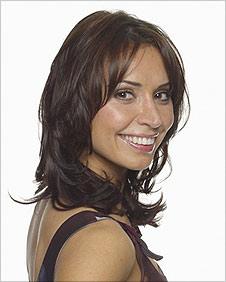The hot topic of keeping talent
- Published

Christine Bleakley said she was "torn" between rival offers
So what does the Christine Bleakley saga tell us about the state of top pay and talent at the BBC?
The presenter's decision to join ITV - and her former One Show co-host Adrian Chiles - came after the BBC pulled the plug on negotiations, saying Bleakley was "still unable to make a decision".
A spokesman said the corporation had "to put the interests of The One Show audience first and the uncertainty didn't allow them to do that."
That was one reason. But the BBC made its move shortly after several MPs and the Taxpayers' Alliance criticised it for offering Bleakley a reported £900,000 over two years.
The chairman of the Culture Media & Sport Committee, John Whittingdale, told the Sun: "This is public money. If she feels she can go and earn vast sums in the private sector, then good luck to her."
Tough agent
Pay in the public sector - and particularly at the BBC - has long been a hot topic.
It has been given fresh impetus by the new Coalition Government's crackdown on top pay, which includes both an inquiry and the publication of top salaries.
Next month, Jonathan Ross will leave the Corporation at the end of a contract which, for many, became a symbol of BBC profligacy.
BBC executives hope his departure may draw a line under that particular episode, but are well aware that any new contract which seems too generous could rekindle the flames.

Trinny and Susannah have fared less well since they moved to ITV
The Sun claimed the MPs' comments were "the last straw" in the Bleakley negotiations.
Insiders do not accept that, but admit such remarks "did not help", and that the longer the saga dragged on, the greater the danger it could become a real issue.
In this case, there were other factors.
During the long-drawn-out negotiations, Bleakley changed agents, joining Avalon, which has a reputation for being particularly tough - a reputation it shares with Jonathan Ross's agent, Off The Kerb.
More than 10 years ago, the BBC let Frank Skinner go to ITV after Avalon demanded he should be paid £20m over two years.
The BBC's director of television Alan Yentob spoke out at the time: "Frankly, the BBC aren't against paying a fair price for talent and shows, but we are not to be taken for granted. There needs to be some give and take."
Great chemistry
With negotiations conducted partly in the tabloid press, one paper reported that Bleakley was inclined to stay at the BBC.
But within hours of joining Avalon, she put out a statement saying she was "torn" between working again with Chiles or remaining at the BBC.
When the corporation finally lost patience at the weekend, the BBC said it had "made a full and final offer to her several weeks ago and made it clear it we would not be entering into a bidding war with other channels."

ITV will pull off a coup if they recapture Adrian and Christine's magic
That could be seen as a signal to other agents anxious to up the ante for their clients.
But there was another factor in the Bleakley negotiations - Adrian Chiles, with whom the star has a great on-screen chemistry, as everyone acknowledges.
The uncertainty about her future at the One Show dated back to Chiles' departure.
He quit after Radio 2's Chris Evans was approached to present the Friday evening One Show in his place, Chiles made it clear he hadn't wanted to leave and hoped Bleakley would join him at ITV.
To lose one One Show presenter may be regarded as a misfortune. To lose both looks like carelessness. And to lose both to a rival who will re-unite them on a new breakfast show could turn out to be particularly unfortunate.
But not everyone who has made the move from BBC to ITV prospers there.
Des Lynam, the acknowledged "face of BBC One" when he quit, lost his relaxed persona when he had to squeeze in two ad breaks during half-time.
Trinny & Susannah's ratings fell when they switched channels and Frank Skinner has now returned to the BBC after his highly-public departure more than a decade ago.
Earlier stars such as Morecambe and Wise and Kenny Everett also found life more congenial at the BBC.
There's a final factor that is being expressed more loudly these days.
Some believe that it's right for the publicly-funded BBC to discover and nurture talent - and then, when performers hit the big time, to let them go to higher bidders in the private sector.
This creates space for others to take their chances - and in due course many of those who left the BBC find their way back.
"Talent comes and goes," Yentob told Radio 5 Live on Monday.
"The BBC is there to grow talent for the future. We are sometimes disappointed when people go, but in this climate we can't put our hands deep into our pockets all the time.
"Adrian and Christine were picked out by the BBC when they had very little track record and they were part of a successful show. [This] is an opportunity to grow new talent."
It won't find favour with all BBC executives - but it's an argument you'll hear increasingly from political leaders.
- Published21 June 2010
- Published21 June 2010
- Published13 June 2010